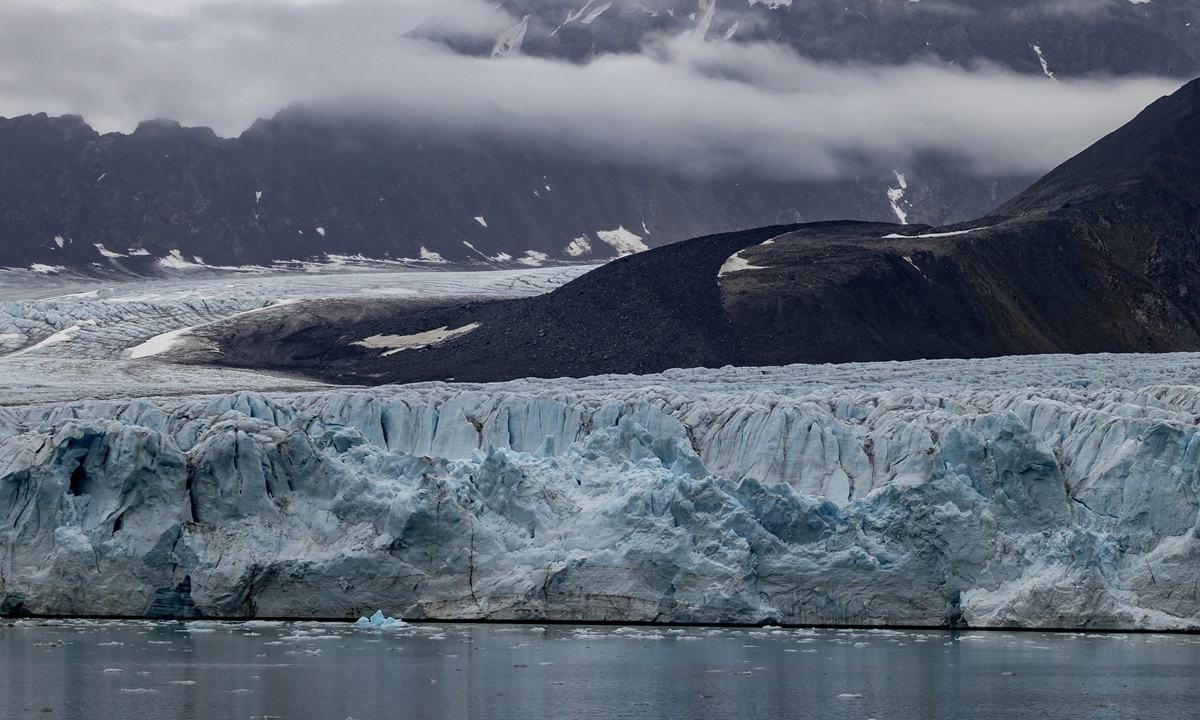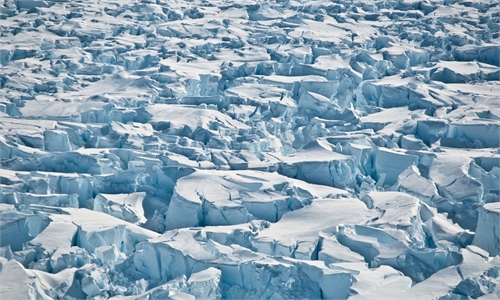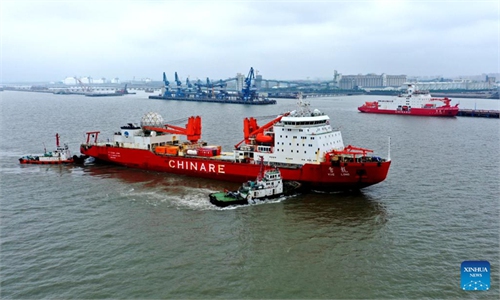US paints Russia, China as rivals with new ambassadorial post for Arctic, brings conflicts to peaceful North Pole
Picturing China as threat to the Far North completely distorts China's Arctic Policy: experts

A view of fiords as they melt due to climate change near Svalbard Islands, in the Arctic Ocean in Norway on July 19, 2022.Photo:VCG
Eyeing the intensifying geopolitical wrestling with Russia in the Arctic as global warming has accelerated ice melt, making the place strategically important for increasing military and civilian presence, the US plans to create a position of the ambassador-at-large for the Arctic as the US-led military alliance NATO hyped Russia and China's interests in the region.As melting Arctic ice transforms international shipping routes, major powers have increased their presence in the region. Some Chinese experts forecast that the Arctic will be a key area for global rivalry in the future, which explains why the US ramped up efforts to enhance coordination with its allies in the region through diplomatic channels and in competing with Russia militarily.
However, hyping China and Russia's presence is part of the US-led West's ill-intentioned attempts to picture China and Russia as strategic threats together, aiming to influence Arctic states with this image, but this is a complete distortion of China's Arctic policy and aims to contain Russia with the excuse of security, experts said.
Unlike the US bringing more conflicts to different parts of the world even to the peaceful Arctic and intensifying confrontations among major powers, China, as a "Near-Arctic State," aims to safeguard the common interests of all countries and the international community in the Arctic and promote sustainable development, they noted.
US Secretary of State Antony Blinken will soon name an ambassador-at-large who will engage with other Arctic nations, and Indigenous groups and other stakeholders, the US government said on Friday, as "the US has long been committed to protecting our national security and economic interests in the region," according to a statement on the website of the US Department of State.
Some media outlets such as the Guardian pointed out that Washington's decision came after Russia has been stepping up its presence near the North Pole with submarines and warplanes while China has been building Arctic research stations. Meanwhile, NATO Secretary-General Jens Stoltenberg warned Friday about Russia's military buildup in the Arctic and China's increasing interest in the Far North, hyping the threats posed by the two countries, media reports said.
"A changing Arctic will surely affect the geopolitical landscape as it has become a new place for rivalry among major powers in the future," Cui Hongjian, director of the Department of European Studies at the China Institute of International Studies, told the Global Times on Sunday.
Washington's top priority for this region now is how to respond to the increasing activities of Moscow. Besides its military presence, taking control over future shipping routes in the region will also become a major focus. In particular, after Sweden and Finland join NATO, Russia will face certain restrictions on its waterway to the Baltic Sea, Cui said, noting that seeking more waterways in the Far North would be strategically important for Moscow.
The new Russian Maritime Doctrine approved by Russian President Vladimir Putin on July 31 stipulated that the US course toward dominance in the world's ocean and NATO's mounting activities are major security threats to Russia, pointing out that the US and its allies seek to limit the country's access to the world ocean's resources as well as vitally important sea transportation lanes, according to TASS.
And the new Maritime Doctrine stipulates stepping up activities in the Arctic, including developing a modern, high-tech shipbuilding industry in the Far East designed for building large-tonnage vessels in particular for the Arctic's development.
Most recently, Russia's Northern Fleet surface ships, submarines and aircraft returned to their home bases after accomplishing combat training tasks as part of a naval strike group in the Barents Sea and on the coast of Arctic islands. The Northern Fleet kicked off scheduled drills for its combined arms strike force for resolving crisis situations in the Arctic on August 17, TASS said.
"Finland and Sweden joining NATO could be seen as part of NATO's intention to focus on Arctic-related affairs," Wang Yiwei, director of the Institute of International Affairs at the Renmin University of China, told the Global Times on Sunday.
Setting up a new position of ambassador to the Arctic will help the US - one of the Arctic nations - to enhance coordination with allies and set up rules while containing Russia's military buildup by citing the excuse of security, Wang said.
The expert also noted that as the US has been pushing forward the idea of "global commons," the strategy of containing Russia and China has been expanding into strategic areas and regions not only in the Arctic but also in space, deep sea bases and the cyber community as some have not clearly identified sovereign jurisdiction. "The US-led West seeks to build their own rules on those areas and regions," Wang said.
However, China views the Arctic completely differently from some Arctic nations, especially when it has no military presence in the region, Chinese experts said, noting that handling Arctic-related affairs should focus on bringing benefits to people around the world rather than use the place to contain another country for a country's own strategic purpose or create more divisions and conflicts in the region.
When participating in Arctic affairs, China prioritizes scientific research, underscores the importance of environmental protection, rational utilization, law-based governance and international cooperation, and commits itself to maintaining a peaceful, secure and stable Arctic order, according to China's Arctic Policy released in January 2018.



